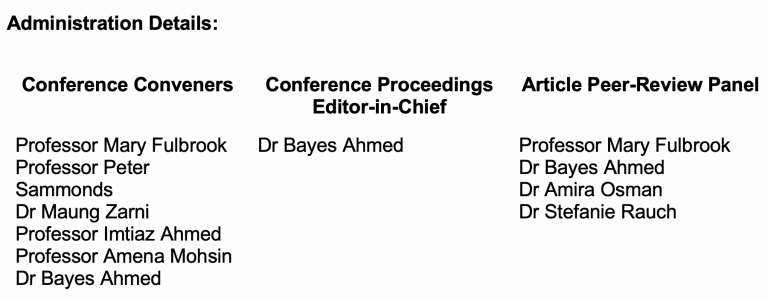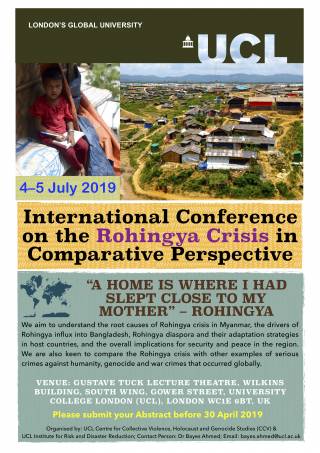International Conference on the Rohingya Crisis in Comparative Perspective
04 July 2019–05 July 2019, 9:00 am–6:00 pm
We aim to understand the root causes of the Rohingya crisis in Myanmar, the drivers of Rohingya influx into Bangladesh, Rohingya diaspora and their adaptation strategies in host countries, and the overall implications for security and peace in South Asia. We are also keen to compare the Rohingya crisis with other examples of serious crimes against humanity, genocide and war crimes that occurred globally.
This event is free.
Event Information
Open to
- All
Availability
- Yes
Cost
- Free
Organiser
-
Dr Bayes Ahmed
Location
-
Gustave Tuck Lecture Theatre2nd Floor, South Junction Wilkins BuildingGower StreetLondonWC1E 6BTUnited Kingdom
The conference will be live-streamed, please follow UCL IRDR Twitter account (@UCLIRDR)
We invite scholars, students, policy makers, humanitarian workers, donors, media, activists, practitioners, officials, NGOs, community leaders, and other stakeholders to submit original short papers, discussions or concept notes on the Rohingya crisis or other cases of genocide, human rights violations, ethnic cleansing and collective violence. The conference theme is interdisciplinary in nature and will cover a range of topics especially targeting (but not limited to) the following:
- Comparative perspectives on state-sponsored violence and genocide
- Role of gender, religion and/or ethics in collective violence
- Policy, identity, advocacy and citizenship
- Exposure to risks, hazardous environments and climate change
- Humanitarian field work and logistics
- Social and economic transformations and their perceptions
- Trauma, resilience and inter-generational transmission
- Law, transitional Justice and conflict resolution
- Forced migration
- Perpetration and complicity
- Media, representation and narratives of violence
We welcome submissions addressing these and other topics from the following perspectives: social sciences, political economy, sustainable development, history and historiography, heritage studies, human rights and dignity, public health, cultural studies, disaster risk reduction, education, humanitarianism, environmental and physical geography, law and social justice, women and gender equity, peace studies, GIS and remote sensing, sociology, development studies, international relations, religious studies, economics, genocide studies, psychology and philosophy, architectural design and shelter cluster, science and technology studies, global and regional security, diversity and inclusion, indigenous rights, language studies, and applied research.
Concurrently a professional photography exhibition (by renowned Photographer Mahmud) and follow-up discussion will be held at the venue, providing a visual narrative of the 2017 Rohingya crisis in Cox’s Bazar, Bangladesh.
The conference is funded through the UCL Centre for Collective Violence, Holocaust and Genocide Studies (CCV) at the Institute of Advanced Studies, and is jointly organised by the UCL Institute for Risk and Disaster Reduction (IRDR) and UCL CCV. There is no registration fee for this conference but it is essential to register. For urgent queries, please call +44(0)2031081101. Please email Dr Bayes Ahmed for any further clarification needed. We look forward to welcome you to UCL in July.

The conference administration (conveners and peer-review panel members) has the right to amend, alter, and edit the conference programme, the list of speakers and anything related to publications (call for papers, abstracts and full papers etc.). Any decision made by them is the final decision regarding this conference.
Speaker Profiles
- Chief Guest and Keynote Speaker: H. E. Ms. Saida Muna Tasneem
Bangladesh High Commissioner to the UK, Ireland and Liberia, and Permanent Representative of Bangladesh to the IMO at Bangladesh High Commission, London
Ms. Saida Muna Tasneem arrived to London in November 2018 to take up her appointment as High Commissioner for Bangladesh to the Court of St. James's. she has taken up responsibility as Bangladesh High Commissioner to the UK, Ireland and Liberia on 30th November 2018. She has also been appointed as Bangladesh’s Permanent Representative to the IMO. Prior to this, Ms. Tasneem was the Bangladesh Ambassador to Thailand and Cambodia and Bangladesh’s Permanent Representative to the UNESCAP from 2014-2018. Back home, she headed the United Nations Wing as well as the a Director General at the Ministry of Foreign Affairs from 2010-2014. She also served as DG (External Publicity) of the Ministry in 2009. Ms Tasneem obtained her Bachelor degree BSC. (Engineering), Chemical Engineering at the Bangladesh University of Engineering and Technology (BUET) and MSC (Public Policy and Management) from School of Oriental and African Studies, University of London.- Special Guest: Chris Sidoti
Chris Sidoti is a human rights lawyer, advocate and teacher. He currently works from Sydney, Australia, as an international human rights consultant, specialising in the international human rights system and in national human rights institutions. He is currently a member of the United Nations Human Rights Council’s Independent International Fact Finding Mission on Myanmar. He is an adjunct professor at the Australian Catholic University. He has been Australian Human Rights Commissioner (1995-2000), Australian Law Reform Commissioner (1992-1995) and Foundation Director of the Australian Human Rights and Equal Opportunity Commission (1987-1992). He has also worked in non-government organisations, including as director of the International Service for Human Rights, based in Geneva, Switzerland, and for the Human Rights Council of Australia and the Australian Catholic Commission for Justice and Peace. In 2007-08 he was the independent chair of the United Kingdom Government’s Northern Ireland Bill of Rights Forum.
 Close
Close



